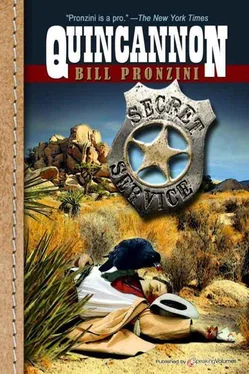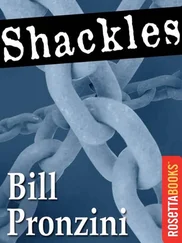Bill Pronzini - Quincannon
Здесь есть возможность читать онлайн «Bill Pronzini - Quincannon» весь текст электронной книги совершенно бесплатно (целиком полную версию без сокращений). В некоторых случаях можно слушать аудио, скачать через торрент в формате fb2 и присутствует краткое содержание. Жанр: Криминальный детектив, на английском языке. Описание произведения, (предисловие) а так же отзывы посетителей доступны на портале библиотеки ЛибКат.
- Название:Quincannon
- Автор:
- Жанр:
- Год:неизвестен
- ISBN:нет данных
- Рейтинг книги:5 / 5. Голосов: 1
-
Избранное:Добавить в избранное
- Отзывы:
-
Ваша оценка:
- 100
- 1
- 2
- 3
- 4
- 5
Quincannon: краткое содержание, описание и аннотация
Предлагаем к чтению аннотацию, описание, краткое содержание или предисловие (зависит от того, что написал сам автор книги «Quincannon»). Если вы не нашли необходимую информацию о книге — напишите в комментариях, мы постараемся отыскать её.
Quincannon — читать онлайн бесплатно полную книгу (весь текст) целиком
Ниже представлен текст книги, разбитый по страницам. Система сохранения места последней прочитанной страницы, позволяет с удобством читать онлайн бесплатно книгу «Quincannon», без необходимости каждый раз заново искать на чём Вы остановились. Поставьте закладку, и сможете в любой момент перейти на страницу, на которой закончили чтение.
Интервал:
Закладка:
The press, Quincannon saw as he crossed the office, was an old Albion. Coffin was setting type — taking oily ten-point from the type case on its sloping frames and fitting it into his brass type stick. The smells of printer’s ink and oil and newsprint, and the pungent aroma of Coffin’s pipe tobacco, were strong in the office.
Quincannon said, “You seem in dark spirits this morning, Mr. Coffin.”
“I am, and with good cause. The damned heathens broke in here again while I was in Boise.”
“Chinese, you mean?”
“Certainly. Who else would I mean?”
“Was anything stolen?”
“No. But it took me two hours to clean up the results of their mischief.” Coffin glowered down at the type stick. “And as if Chinamen running amok aren’t trouble enough, I have to do all my own typesetting in order to get the next issue out on time. Damned nuisance all around.”
“What about the compositor who sometimes works for you? Jason Elder, is it?”
“Him,” Coffin said, as if the words were an epithet. “I went looking for him early this morning; he isn’t at that pigsty he lives in and seems not to have been there for days. He is nowhere to be found.”
“You have no idea where he might have gone?”
“To hell on his opium pipe, for all I know or care. Tramp printers! Even at their best, they are notoriously unreliable.”
“If you don’t mind my saying so, Mr. Coffin, I’ve heard it mentioned that you yourself were once a tramp printer.”
Coffin didn’t answer immediately. The type stick was full; he justified the line and then turned to set it in the galley, completing a column. “I was much younger then,” he said. “Young men are prone to foolish endeavors. Besides, it was my father’s profession — printing, that is. He wasn’t a tramp; he owned his own printing and engraving shop in Kansas City for thirty years.”
“An expert engraver, was he?” Quincannon asked.
“Yes. He designed his own type face, among other things.”
“And you inherited his talent in that area?”
“No, not at all,” Coffin said. “I have limited abilities in the printing trade; three years of tramping from Kansas to Montana convinced me of that. Writing copy is a far better occupation than setting it, and a far more suitable one for me.”
“I bow to your knowledge of both fields. The only profession I know well, I’m afraid, is patent medicine.”
Coffin started to comb fingers through his hair, remembered in time that they were stained with ink, and wiped them on a press rag. He lit an already ink-smeared pipe. When he had it drawing he said, “What brings you here this morning, Mr. Lyons? No takers for your nerve and brain salts?”
“On the contrary. I’ve already sold six cases to Mr. Judson at the Harmony Drug Store.”
“A fruitful morning for you, then.”
“So far as business goes,” Quincannon said. “Privately, the news is much grimmer.”
“Yes, the murder of your friend Whistling Dixon.”
“Then you know about that.”
“Of course. News travels rapidly in Silver — and bad news reaches my door sooner than most. I suppose you’re wondering why I’m here setting type instead of out gathering information.”
“I am, yes.”
“I’ve owned the Volunteer three years and never missed a single Wednesday’s publication,” Coffin said. “It is a matter of pride with me. If I don’t spend the rest of today and most of tonight right here in the office, there will be no paper tomorrow.”
Quincannon asked, “But have you spoken to the marshal? Do you have any further details?”
“Is that why you’ve come, Mr. Lyons? Seeking information on Dixon’s murder?”
“Yes.”
“Well, I’m afraid I can’t help you. I haven’t spoken to Marshal McClew yet and I expect I know nothing more about Dixon’s death than you. And I won’t until McClew comes to see me later today. He always does in such matters, just in time for me to write my story. He enjoys seeing his name in print.”
“I’ve heard that the Owyhees are a haven for outlaws,” Quincannon said. “Is murder common in Silver City?”
“Not uncommon, shall we say. And that is another reason I’m here and not out with McClew. Murder, unless it happens to be of the spectacular variety, has limited news value.”
“Yes — the shooting of a cowhand can hardly be called spectacular, can it.”
“Frankly, no. If that fact offends you, so be it.”
Coffin picked up a page proof he had already run off, scanned it, frowned, and then turned to one of the galleys. Quincannon watched him plug a dutchman in a poorly spaced ad, then asked, “Were you well acquainted with Dixon?”
“I barely knew him,” Coffin answered. “I spoke to him perhaps twice in the three years I’ve been in Silver.”
“Do you know of any friends he might have in town?”
“No.”
“Was he acquainted with Jason Elder?”
Coffin squinted at him through smoke from his pipe. “What makes you ask that?”
“Dixon was murdered and Elder seems to have disappeared. Perhaps there’s some connection.”
“I find that unlikely. As far as I know, Elder and Dixon never met.”
“Tell me this: If Elder worked for you only occasionally in recent weeks, how was he able to support his opium habit?”
Coffin scowled; he had grown weary of all the questions. He said, “I have no idea. Nor do I care. Now if you will excuse me, Mr. Lyons, I have four more pages of type to set and an editorial to write.”
Quincannon left the newspaper office, went to Jordan Street and uphill along it. He wondered if Marshal McClew had found out anything important in Slaughterhouse Gulch. But that was unlikely, if Whistling Dixon had been murdered by the gang of koniakers; they were too disciplined to leave obvious traces of themselves at the scene of a fatal shooting. Still, should he talk to McClew anyway? He decided against it. Perhaps later, but not just yet.
Thinking was a chore, out here with the rumbling wagons and the constant noise from the mines; he let his mind go blank as he continued climbing to the upper reaches of Jordan Street. The buildings clustered up there were little more than shacks, some of them made of tarpaper and hammer-flattened tin cans — the Chinese quarter. Yellow faces replaced white; coolie outfits and straw hats replaced the conventional garb of the mining camp. Two middle-aged Chinese came down the slope toward him, both with wooden “yokes of servitude” across their shoulders, five-gallon water cans balanced on each end. Aside from the digging of ditches and the building of roads, one of the few jobs open to Chinese in these mountains would be delivering water from door to door for a few cents a day. Even more demeaning were the other tasks for which the yoke would be used: to carry slop for the hogs and buckets for the cleaning of white men’s privys.
Near where Jordan Street petered out against the steep mountainside, Quincannon spied a small business section: a handful of stores, a pair of joss houses, some kind of meeting hall made of heavily weathered clapboard. He went along there, looking at each of the buildings. All were marked with Chinese characters; only one bore any English lettering, but that was the one he was interested in. A small sign
to one side of a door hinged with strips of cowhide said GENERAL STORE, and below that, in smaller lettering, YUM WING, PROPRIETOR.
Quincannon pushed open the door and stepped into the dark, windowless interior. The mingled scents of herbs and spices and burning joss sticks assailed him. He paused to allow his eyes to adjust to the murky light. At first he thought the store was deserted; then he realized that a man was standing motionless behind a long plank counter. The man did not move or speak as Quincannon crossed among tables laden with Chinese clothing, past shelves of pots and pans, tea, medicinal herbs, and other, unrecognizable items.
Читать дальшеИнтервал:
Закладка:
Похожие книги на «Quincannon»
Представляем Вашему вниманию похожие книги на «Quincannon» списком для выбора. Мы отобрали схожую по названию и смыслу литературу в надежде предоставить читателям больше вариантов отыскать новые, интересные, ещё непрочитанные произведения.
Обсуждение, отзывы о книге «Quincannon» и просто собственные мнения читателей. Оставьте ваши комментарии, напишите, что Вы думаете о произведении, его смысле или главных героях. Укажите что конкретно понравилось, а что нет, и почему Вы так считаете.












